Paul Sweeney, MP for Glasgow North East, discussed issues surrounding the National Shipbuilding Strategy during a debate on UK sovereign capability in Parliament.
Paul Sweeney is a Scottish Labour politician and has been the Member of Parliament for Glasgow North East since 2017. More importantly in this context, he was formerly employed by BAE in Glasgow. Paul has worked with the APPG for Shipbuilding which has begun an inquiry into the Government’s National Shipbuilding Strategy, taking evidence from a range of maritime security stakeholders and industry.
Sweeney stated that the strategy has been “used as cover to reduce the scope of ships that are qualified to built in the UK”. The MP said it reduced the types of ships that must be built in the UK to frigates, destroyers and aircraft carriers, saying that the NSS was “restricting the scope of orders that can go through UK shipyards”.
Paul pointed out that the previous Terms of Business Agreement had provisions for most Royal Navy and RFA vessel types to be UK built and added that the new strategy “falls short on how it’s going to deliver” industrial benefits due to lack of investment caused by a lack of certainty over future orders, driving up costs of the vessels that are actually ordered meaning of course, less are eventually ordered.
I messaged Paul earlier in the year to discuss the prospect of yards around the UK beginning steady and sustainable production of new vessels using future programmes as a basis.
“The greatest flaw to have plagued British naval shipbuilding since the 1980s is the issue of small batch classes of escort vessels, especially when subject to competitive tendering. Contrast that with the United States, which has been building the Arleigh Burke class since the 1980s.
In the UK small batch numbers and a lack of certainty over production locations have militated against efficiency curves from long production runs and created feast and famine dead weights on shipyards which bleed skills and knowledge.”
Referring to the current issues around the tendering of the Fleet Solid Support ships internationally, he said during the debate:
“We’re seeing the government happy to tender contracts overseas in international open competition which quite easily under the Treaty on the Functioning of the European Union (article 346) could be designated as UK protected builds. It’s entirely at their discretion to do that. Any notion that their hands are tied is bogus.”
What is Article 346?
EU law requires most government contracts to be procured via an open, competitive process. The main EU legislation in the defence domain is the Defence and Security Directive 2009/81/EC, transposed into UK law by Defence and Security Public Contracts Regulations 2011.13
However, Article 346 of the Treaty on the Functioning of the European Union (TFEU) provides for an exemption to the procurement rules where a country considers it to be necessary for national security reasons: “any Member State may take such measures as it considers necessary for the protection of the essential interests of its security which are connected with the production of or trade in arms, munitions and war material”. Article 346 refers to a list drawn up in 1958 by the Council of Ministers of products to which the provisions
The Government’s procurement plans for up to three new support ships for the Royal Fleet Auxiliary are facing opposition from defence analysts, Labour, the SNP trade unions and many others.
“This model should be further extended to maintaining big ship construction of vessels with a beam larger than 20m at Rosyth dockyard, by ensuring a continuous production run after the Queen Elizabeth class is complete by building the new Royal Fleet Auxiliary Fleet Solid Support ships and then the successor to the Albion class there”, Sweeney advised.
According to a briefing paper in the House of Commons library released earlier, the programme is currently in the Assessment Phase with the competition expected to be formally launched towards the end of 2018 and a contract signed in 2020. The MoD says the contract will be for two ships with an option for a third.
The briefing paper states:
“The Government intends to compete the contract internationally. Labour, the SNP and the shipbuilding trade unions argue the contract should be restricted to UK shipyards to support the shipbuilding industry, secure jobs and retain skills. They argue the proposed ships are ‘warships’ and as such, the Government can use the Article 346 exemption to exclude the contract from EU procurement rules on national security grounds.”
The TUC has also assessed the Article 346 exemption argument and argues the Government “has the sole right to determine” what its essential national security interests are. The TUC claims “other European nations have used the exemption to place orders for similar support ships with their own shipyards since the Directive was introduced.”
December this year will see the formal issue of documentation inviting bids for the design and build contract and in 2020, the contract for design and build is to be awarded.
Paul also explained that building the new Royal Fleet Auxiliary Fleet Solid Support ships and then the successor to the Albion class in Rosyth would be of huge benefit to UK shipbuilding and allow for at least four primary shipbuilding sites.
Towards the end of the debate Sweeney responded to remarks that only ‘complex warships’ should be built in the UK by pointing out that the construction of auxiliary vessels has allowed the UK to retain the skills to build complex warships and after citing the example of RFA Wave Ruler and more recently the five River class ships being built on the Clyde to sustain the workforce at the yard, he said:
“By utilising those less complex nut nonetheless complex warships, by smoothing that build cycle, we retain the skills, we maintain the infrastructure, we retain the critical mass to build to build the complex warships which includes frigates, destroyers and aircraft carriers.
We have to look beyond that arbitrary restriction and maximise the purchasing power of the Ministry of Defence to deliver UK sovereign capability.”
This would also allow for industry that would become sustainable, ships to become cheaper and hopefully, the Royal Navy to afford more hulls.


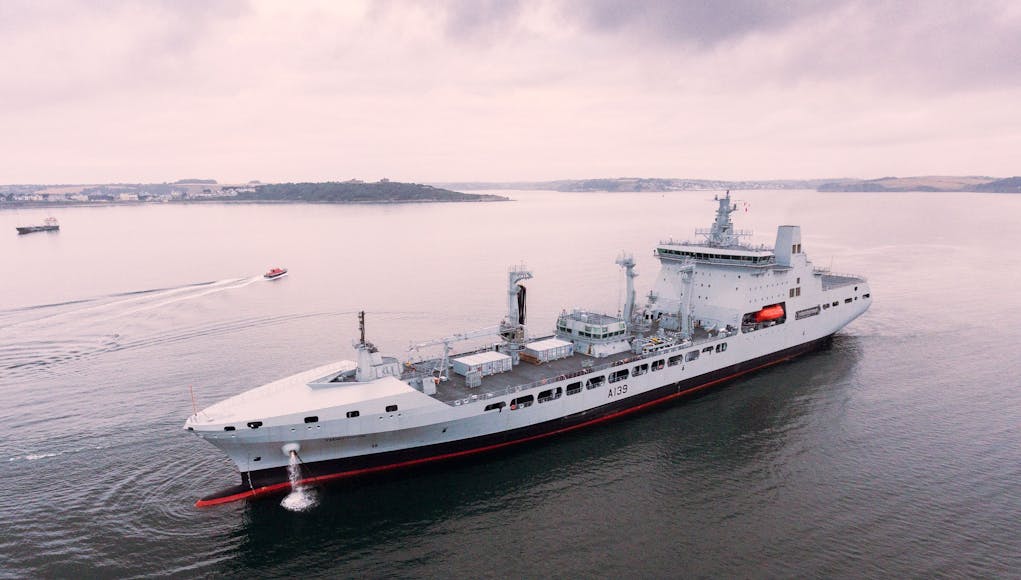


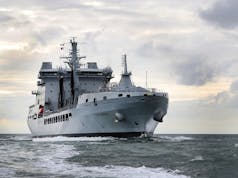
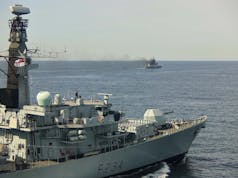
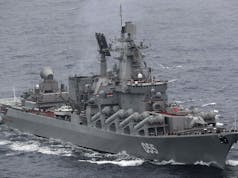
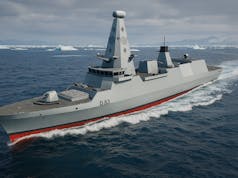

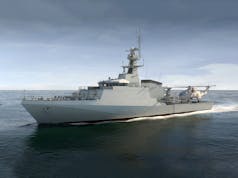

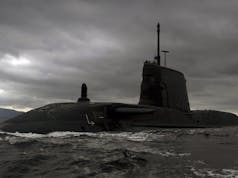

This “National Ship building Strategy” He speaks of is basically Scotland. Nothing left south of the Border now, Staggeringly !
Yes but at least he is making and argument we need to get rest of uk MPs to do their bit too and have 4/5 site where we can build ships and have an planned order book for a decade at least so that yards invest in infrastructure which will make them more competitive in the future. By all means allow foreign companies to build ships but they have to be done j the U.K. with investment in infrastructure to support that or rent infrastructure from existing builders.
But, We had 4 or 5 Sites up until a few Years ago, And the last one Capable of building Entire Warships, has just been Shut Down. Gone are the Days of Devonport, Chatham, Portsmouth and Newcastle. F26’s are purely Scottish, F31’s will be Bit Part English but probably Assembled on the Clyde.(That’s If the Government ever actually get their act together and order them. “At least 5 ” was the boast a couple of Years back, Oh Yeah, We’ll see about that.
The boast was because they are cutting the type26 to 8 hulls they will build 5 type 31s and probably more increasing RN hull numbers. We will 100% get 5 type 31s but they pretty much promised more than 5! But I can’t see that happening…
“Last one capable of building entire warships,has just been shut down ” ? Govan and Rosyth both are capable of building complete warships it was the UK Government that dictated that the type 45 s would be built in parts around the UK not the builders, it also added approximately a third to the overall cost again it was the government that thought little of this extra cost.
Type 31e won’t be assembled on the clyde they will either be built in Merseyside bae offering or in Rosyth babcock offering please do your research instead of this little englander rhetoric it’s about UK shipbuilding. With your argument your letting the govt, the party of Brexit off the hook for their anti UK manufacturing agenda how ironic.
Devonport, Chatham, Portsmouth?
They have not built warships for 50 +years.
The last at Portsmouth – 1966 as I recall.
Pompey built OPV’s / parts of the T45 and parts of the QNLZ until only recently. True the last proper frigate was HMS Andromeda a long time ago but it was not because they did not want to build them. We need more ships but will the MP’s North of the Border accept a larger defence budget – doubt it!!
Gunbuster, Exactly.
BS Portsmouth built full warships in the 2000s
Get the rest of uk MPs to do their bit? They couldn’t give a shit and I say that with a heavy heart.
The government / MoD (N) / whoever gave us the T31 programme. And that tells you all you need to know about the official collective understanding of shipbuilding.
The T31 program Is either going to be a Ship of 4500 Tons with no Armaments whatsoever apart from a “Designed for” but “Not Built With” arrangement, Or a BAE Systems Version that’s a lot smaller that appears to be the Modern Equivalent of the “Antelope” class.( Sorry but That’s just my opinion and I know many of you will not agree but, Seriously, 250 Million per Hull ? )
Yes.
That’s total crap of course they will be armed even OPV have a gun , so peddling this nonsense from your armchair about a class of ship without ANY armaments is totall balls they will be armed main gun , basic air defence missiles , small calibre guns . Not as much as. They should be but weapons they will have
I agree Paul Sweeney is only interested in Scotland, so where would it leave us if half way through a build Scotland became independent. Would they still be part of the UK and eligible to build Naval warships under Article 346 ?
Unfortunately labour sold out Vosper Thornycroft to Bae Systems with their so called joint venture and eventual buy out so we only have Cammell Laird left as any Naval shipbuilding yard out side of Scotland. However having had 25 years in offshore fabrication and 18 years in Naval shipbuilding I know the offshore yards could easily have provided support had they also not fallen by the way.
The national shipbuilding strategy is a non-starter and a waste of uk taxpayers money. We are no longer a country with one of the largest navies in the world, and we have to accept our new place in the world.
Reality is there are two types of nations, the type that buy high end and the type that buy cheap.
High end will self build and the UK just can’t compete when it comes to cheap.
We need to stop wasting money trying to get exports and focus on what is good for our own armed forces, whether that is foreign or domestic purchases.
I don’t hear anyone saying we shouldn’t buy the apache because its not UK developed and built, because it is just insanely good value and a great asset, and the same needs to be the case when it comes to the navy. What gives our armed forces the best bang for the buck.
It doesn’t seem like you have read the NSS, or even the foreword to it? The following is directly from the foreword.
“To achieve our ambitions we need a strong shipbuilding industry as part of a wider maritime sector. Today some 111,000 people are working in the maritime and marine sectors in the UK, including in the shipyards,2 supplying the parts, or supporting the equipment that keep this great industry alive, from Appledore to Rosyth and beyond. Sir John Parker’s 2016 report shows the Industry has not stood still. Indeed, there has been a renaissance in the sector fuelled by a diversification into support, repair and wider marine engineering work.
To maintain this momentum, we need to act now. Our vision is of an even more modern, efficient, productive and competitive marine sector growing on the Clyde and on the Forth, in Belfast and in Barrow, and in the North-East, North-West and South-West of England. We will continue to build Royal Navy warships only in the UK, while encouraging international collaboration, and harnessing open competition for other naval ships. Our new framework will ensure the impact on UK prosperity will be considered as part of our procurement decisions. This National Shipbuilding Strategy gives UK Industry and UK shipyards certainty on the warships which will be built in the United Kingdom, and clarity on the plans for support shipping, where we expect them to make compelling bids in an international competition.”
“…we need a strong shipbuilding industry as part of a wider maritime sector.”
That’s just wishful thinking if the navy is kept so small that it’s barely viable. If we were investing in building the fleet to a level where we can cover all existing commitments with a little spare capacity for inevitable attrition when conflict occurs & kept enough trained , skilled sailors to man it, then that platitude would hold water; the orders would be there to support an adequate naval shipbuilding industry. What we have is a shocking suffocation of naval shipbuilding cut down to the bone. A few well placed missile strikes could halt our naval shipbuilding/repair & refitting programs.
You’re assuming a conflict with a Peer 1 adversary is going to provide time for attrition replacement? Seems highly optimistic to me. Hoping to have enough ship yards to avoid being taken out by missiles is totally impractical.
Glass half full, Appledore can be scratched off that list.
Why?
Because the lease is expiring and Babcock is shutting it. I left it in because it was in the original text of the NSS.
The problem with Appledore is that it doesn’t have any other business. Look at other shipyards around the UK and they do have other business and so are frankly better candidates for long term success based on a mix of commercial and naval business.
No. The problem with Appledore was Babcock. The problem with Appledore is that it does not have its own online identity to pursue other business as Babcock wanted this facility for its own reason and going for one OPV tender from a Country that enjoys eu empire funding was going to end in tears.
The TLDR version? NSS is not just about building naval ships!
No it’s about propping up an unprofitable industry. The money is better spent on the future and building new industries that are self efficient and will bring value back to the UK.
We need to split defence decisions from policitcs of job creation in Scotland, and instead make them based on what is best for defending our conntries interests.
The 110k figure is a huge misleading one, how many of them are reliant on ship building, maritime and marine sector is very diverse.
How is it unprofitable?
As long as the UK mandates building war ships in the UK then it needs a viable ship building industry or it will be “propping up” to an ever increasing extent. TOBA will look cheap by comparison if it isn’t addressed.
You can make an argument that it would be better to generate wealth and jobs for the country in other commercial fields and then use the tax revenues from that to buy ships from other countries, but that’s a completely different discussion.
Yes! Sir John Parkers report did state that defence contracts with a decent profit should see decent investment in people and facilities, which is something we don’t see in the UK at the moment. How many yards modernised to Italy, Germany, France, Japan and South Korea standards and more with these lucrative warship contracts. No, as warship building does not promote efficient building or demand investment. Look at the Type 26’s being sloooooowed doooown.
Steve. You can’t separate and shouldn’t separate the economics and defense spending. Boeing is the company it is today because of the US investment in military aircraft which transferred into a commercial aviation. However there should not be blank cheque either defence companies should be demonstrating they are providing products efficiently improving productivity and hopefully able to win exports which brings money back into the UK boasts GDP and thus defence spending. If you get this right everyone wins.
What new industries are these? Ones that other Countries are involved in too.
We are entering the virtual digital shipyard era in which everything down to the last weld seam butt and fillet can be measured and given a cost along with benifit to the economy and money lost if given abroad etc. ONS and NAO should be on this
If Germany, France, Italy etc. can manage to build ships and export ships, then so can we.
We will always have a Royal Navy, so we will always need shipbuilding facilities, it is very much in our interest that these facilities have a steady stream of work so it is worth their while to invest in new facilities and equipment so that British shipbuilding is efficient, cost effective and competitive.
And yes, we will get exports on the Type 31e, so no, it is not an “unprofitable” industry.
That place in the world would be as the 5th/6th largest economy, permanent member of the UN Security Council, Nuclear capable, recently secured significant success selling the design of the Type 26 abroad and having just completed the trials of the largest and most complex surface ship completed outside of the USA in the 21st century.
In a country that heavily subsidises private housebuilding, farming to name just two and spends £13Bn on foreign aid the idea that a £100m a year could not go on supporting UK Yards to build support vessels is a total nonsense. It is more a case of political dogma, lack of vision and that this industry is not in SE England so politically it doesn’t matter.
Today even the % of UK components in warships is greatly reduced which only 20 years would have been unthinkable.
Soon without further orders Westland (Leanardo) will go so we will no longer have the ability to manufacture helicopters and without care fixed wing aircraft could follow. Well of course it won’t matter because we got them cheap…….
We have sold control of many our core industry’s unlike any other major nation and you would like to do some more damage.
We need to maintain and enhance what we have left and make them competitive against peer nations and not give up because a bean counter thinks he can save a couple of quid in the short term.
There seem to be two errors (or one that is repeated) in the first paragraph of content, namely NSS is “used as cover to reduce the scope of ships that are qualified to built in the UK” and “restricting the scope of orders that can go through UK shipyards”. The NSS is not restricting the scope. There is nothing preventing UK shipbuilders from tendering for FSS ships, the NSS just opens them up to international competition too.
Sweeney goes onto to say “This model should be further extended to maintaining big ship construction of vessels with a beam larger than 20m at Rosyth dockyard … by building the new Royal Fleet Auxiliary Fleet Solid Support ships and then the successor to the Albion class there”. Rosyth is owned by Babcock so it seems Sweeney has already “awarded” the referenced ship contracts to Babcock without any competition? Perhaps he wants to nationalise the shipbuilding industry again because it worked out so well last time? While what he suggests might make sense as the result of Babcock winning the competitions, it might also make sense for the builds to take place at Cammell Laird, or even Harland & Wolff were they to win based on a more competitive tender or some mix of them.
It is interesting to reflect that we do not demand that RAF aircraft be built exclusively in the UK, because of course its not viable to do so anymore. This means that for Team Tempest to be successful BAES will have to be competitive on a WW basis, both financially as well as technically, otherwise the program is likely to get cancelled. Compare that to the naval shipbuilding side of BAES. While certainly all the increased costs of T45 and T26 cannot be laid exclusively at BAES’ door, there has certainly not been any incentive to drive costs/profit margins down due to competition.
The whole point of NSS is to to create a military ship building strategy that reinforces and complements commercial marine manufacturing with a number of locations/companies around the UK, to enable domestic competition that delivers lower cost ships for both military and commercial markets from commercially successful yards/companies. Guaranteeing work to UK yards doesn’t deliver this, capitalism and a company’s self interest doesn’t work that way.
I have a question, what commercial ships would we building then?
Whatever makes commercial sense to the respective shipyards, or coalitions of shipyards. That probably seems a facetious answer but its not meant to be.
Govt. shouldn’t dictate what gets built, or even whether anything gets built versus shipyards being say the center of excellence for refit work, offshore wind power work etc. As the NSS foreword points out, “Indeed, there has been a renaissance in the sector fuelled by a diversification into support, repair and wider marine engineering work.”
Private companies did this by themselves. They are in the best position to decide what makes commercial sense for them. Sensibly structuring a naval shipbuilding program reinforces this and both shipyards and govt. benefit.
I do wonder why there is no British Damen.
CFP hasn’t helped.
I would say the decline of the RN hasn’t helped either, obviously. Since WW2 successive governments have invested in the idea that we are land power and we couldn’t afford to defend Germany and have a navy. Even when our European neighbours sly subsidised their shipbuilding while we happily subsidised their defence. In peace an army has little utility unlike a navy. And in the nuclear age an industrial in war has little utility too, probably less. As soon as we had enough nukes we should have left Germay and returned to the sea. And just built ships. The union problems would have worked themselves out probably as they did in every other industry eventually.
You should also consider that we don’t really have the geography to knock out 20k TEU ships as cheaply as the Koreans. Building a carrier or two in blocks is one thing. Building commercial ships in such a fashion not so much. (I had better qualify before some pedantic numpty says something. Yes commercial ships are built in blocks too. But for the most part most of the blocks are build on the one site or ones that are neighbours.)
There is a danger in assuming that a vibrant shipbuilding industry in support of UK defense purposes has to build big commercial ships, where clearly large subsidised foreign manufacturers provide the toughest competition.
If we look across companies like Ferguson Marine, Harland & Wolff, Cammell Laird, A&P and Babcock we can see a range of marine related capabilities and projects. No two companies are the same in markets they choose to address. I see the greatest capability for these companies being adaptable, flexible with highly skilled value add workforces capable of constructing complex marine structures in response to changing market needs. The RRS Sir David Attenborough seems to be a good example of those skills, winning against international competition.
France, Germany and Italy all build and export cruise ships, there is no reason we can’t do that either.
We have to stop waging war against our heavy industries and start rebuilding them with modern state of the art equipment, and start supporting them too.
But we do! South Koreans are quite expensive too.
“You should also consider that we don’t really have the geography to knock out 20k TEU ships as cheaply as the Koreans”., The South Koreans did not either until investment. There at the moment maybe certain ship type we don’t want to get involved in because of competition by subsidized countries like expensive South Koreans, but that means we should not be buying from them or any other rivals. it’s been said by the cruise ship firms/line that they would like to buy British if only we were in the game. If it is worthwhile is maybe one thing but the fact is, we can compete with more countries than we realize. The UK has to whine it’s way off of these grey MOd ships, they do not make for efficient shipbuilding plus you have the added “UK” electrics the reduce hull numbers which make people believe that UK shipbuilding is expensive. It is with this protected UK content. The fewer Hulls less shipbuilding practice with a downward spiral in shipbuild, BAE makes more money in their systems that youngsters can do in their back rooms and make billions from in mass markets.
So the NSS is really an INSS that does not compliment UK shipbuilding as it does not allow it to invest properly as Sir John Parker would like to see?
We are relying on international tendering, to be honest, and the UK MOD to be smart because going for South Korea for the Oil Tankers was hugely expensive but looked cheap on the face of it. This is new as RFA ships that were not built in the UK were taken up from trade, there was never a policy for tendering internationally and with modern technology the MOD can have a far better idea of prices and costs. The biggest most significant shipbuilding is in the FSSS in terms of tonnage. Why has it had to come under a new policy? The truth is it’s the UK feeling obliged to obey eu procurement laws.
While on the topic of NSS I’d like to throw out a rationale for why I think the T31e is priced at £250M, beyond just providing a low cost GP frigate for the RN, because I suspect it is far more about being the basis for a sustainable naval shipbuilding program, which is critical to the NSS and why the program has taken the path it has up to this point. If it was only about costs for the UK then the possible $3.5B Chinook purchase amongst other big ticket purchases would suggest that £400M for a frigate would be relatively easy to budget for.
Its not just larger countries that want to build their own warships, smaller countries have been going in that direction too. Setting an aggressive price point for the T31e does two things for this market:
1) It may well be a price point that is difficult to achieve for smaller countries building their own frigate in low single digit numbers, regardless of lower labour costs, especially with the build risk and potentially escalating costs associated with a lack of naval shipbuilding experience. It will be a proven design used by a leading naval nation.
2) If the £250M price is still too much for some countries, then selling the T31e after a 15 year RN life is going to provide a ship with plenty of life left in it, for countries that don’t have anything like the RN’s operational tempo. The re-sale price doesn’t have to be bargain basement either for exactly this reason, but it will be way under what an equivalent vessel would cost to build new and likely far less than used vessels from other navies unless they are much older.
In other words T31e is a critical enabler for the NSS which is why it is priced as it is.
T31 is priced as it is because HMG doesn’t have a clue and the modern RN leadership is too politicised.
T31 needs to work for us.
If we’re following the NSS then the type 31 should not be refitted but sold it’s to some extent disposable it’s competitive to build new rather than have expensive refits. This means it’s an open order book the first sold before refit is required and another ordered. Savings from not refitting and proceeds from the sale make significant contributions to the new ship.
The problem with his argument comes down to cash like most things. If we build UNREP ships in UK yards they will cost more. The defence budget is fixed therefore it will mean less money for something else within defence. If we want to build all ships in the UK someone in govt needs to come up with difference between the best price from our yards and the best price from overseas. Unless/until that happens the best we can do is mutually beneficial deals with the overseas yards. Eg R.O.K. operating Lynx/Wildcat and buying Rolls Royce marine engines.
Yes. But there is the churn factor to consider. If we build in the UK the money, sort of, stays in the UK. Whether that is simply in wages or maintaining skills and so on.
We have to be pragmatic. Building the Tides abroad made sense because of QEC. B
There’s more to it than just the price as France, Germany, Italy, Spain, U.S.A., Canada, etc., etc., etc. realize, do you see them rushing to Korea? It would be cheaper after all, and that is the only thing that matters, right? Wrong. It keeps our people in well paid jobs, it keeps our industries alive, and it keeps the money in our country.
Stephen I don’t think you got my point about the budget. The defence budget like all is fixed in advance. If the price of A is higher than we either buy fewer A or fewer B. I’m not disputing your economic arguments I’m simply stating where we are right now.
Why do you think money stays in the country. Most people use their wages to buy foreign goods. And this is why having exports of t31 is so important to offset these imports. You don’t win exports by throwing blank cheques at industry. Having a competition focuses the company’s attention on becoming efficient and lean.
How do they cost more? Please tell me this! Do clarify and give detail on this assumption.
@ Glass Half Full
I would say the danger is assuming that we can be even more successful in the warship market than we are now.
And much the same can be said about commercial building. As I said we have no Damen.
Oh I don’t assume anything. A lot is riding on both the govt. and the ship yards being able to make this work. What encourages me is that despite all the odds we still have ship yards engaged and apparently successful in marine work per the comment from the NSS “… renaissance in the sector fuelled by a diversification into support, repair and wider marine engineering work”.
It also seems to me that we shouldn’t get carried away in terms of the scope of what a successful UK ship building industry looks like. For example assume we never sell a new T31e for export but because of the low build cost we can successfully sell RN vessels off after 15-18 years. Then that alone significantly increases the number of ships built without it costing a fortune to do it. If the T31 is used to replace 5x T23 and 13x MCMW then that’s a base of 1x ship per year indefinitely, without any increase to the current surface fleet. Obviously the ambition is for an increase in hulls.
Completely agree.
We will always have a Royal Navy, so we will always need shipbuilding, so it is in our interests that British shipbuilding has a relatively steady stream of work otherwise it will never be worthwhile to invest in new facilities and equipment to make British shipbuilding as cost effective, efficient and competitive as possible.
B.A.E.S. should still build the frigate factory at Scotstoun. Rosyth should keep the gantry crane and the solid support ships should be assembled there and other large Navy and R.F.A. ships in the future. Cammel Lairds should get the Type 31 and of course submarines in Barrow.
All British taxpayer funded ships, Royal Navy AND R.F.A., should be built in the U.K. this is what France, Germany, Italy, Spain, U.S.A., Canada, etc. do, then we can have a decent sized shipbuilding industry here in the U.K., and it will make it worthwhile to invest to keep us competitive.
The problem with your allocation proposal is that you just entirely eliminated any competition by having dedicated resources for different classes of vessels. There is no incentive for ship builders to keep costs under control and reduce margins if they face no competition.
“Contrast that with the United States, which has been building the Arleigh Burke class since the 1980s.” –
There are advantages to just build the same ship for decades but there are also disadvantages. In means US shipbuilding is surprisingly behind the curve when it comes to modern shipbuilding practices. The Arleigh Burke class is a vessel designed in the 80’s using systems first developed in the 60’s and 70’s then built using thirty year old shipbuilding and fabrication techniques. The latest Flight II are cramped with habitability standards that are inferior to the latest UK ships. The Flight IIa and III are so crammed with systems that the hull is at the edge of acceptable limits when it comes to freeboard.
In respect of the Gerald R Ford class they are built using techniques that can be traced back to the 40’s and 50’s. When people involved with the QE class build visited the yard building the new US carrier they were surprised to see how much file to fit work and adjustments that needed to be made to finished sections.
It also means that US yards have struggled to develop new designs due to lack of experience.
They do tend to get the best use out of their equipment though , think B52 Bombers with the latest life extension planned up to 2050 or so. That’s nearly 100 years !
The only reason Arleigh Burkes are cramped are because the USN refuses to cut crew size unless necessary. In addition the Flight IIa and III ships are much more automated than previous units. The only thing keeping their crew numbers up is once again reluctance to cut crew viewed as necessary during an emergency. As for habitability? Yes I have no doubt that NAVSEA required first and foremost that it be a warship, and wrote the living standards accordingly. The crews won’t thank you for making them comfortable if you didn’t put in enough magazine space to keep them alive. A gallon of sweat for a ounce of blood is always the best policy. Certainly better than the reverse.
As for Ford being built with 40s and 50s techniques? No they are not that is one of the most ridiculous things I have ever heard. The Ford Class are constructed by blocks of prefabricated sections. Just like every CVN since USS Roosevelt. In the 40s and 50s you built from the keel up.
“American shipyards also struggle to develop new designs due to lack of experience”.? Considering the size of the fleet they are not inexperienced. As for entirely “new” designs? The Navy and Congress have consistently preferred to think of ships more as shells and frames to be upgraded than be wholly replaced. You cannot compare Aegis 1980s to the current Aegis Baseline 9. In any other Navy the Flight I and IIa ships would have been different as would the IIIs but the USN prefers to keep the same shell and change the internals.
I think the UK does need a NSS and I think we do have a viable shipbuilding industry. This is important stuff for the whole country.
We build x amounts of ships allied to x amount of boxers, Ajax and lets not forget the trains we are putting on our railways etc and we have a viable steel industry, have both and we have a viable service industry supporting all this which equals jobs, tax revenue and most important social benefits.
If we get it right, we then may be able to export (and the UK exports quite a lot actually) and then more jobs etc. We need to achieve this without getting complacent, we need to make it a national endeavour and we need to commit to it.
So for me we do have a requirement but we dont have the vision or the political will
Yes.
The majority of our MP’s only seem interested in their re election, their gold plated pension rights, their unchecked expense accounts and their inflation proof salary. Their interest in the defense of our country is minimal at best.
[…] many argue that the claim “they are not warships” is arbitrary, more on that […]